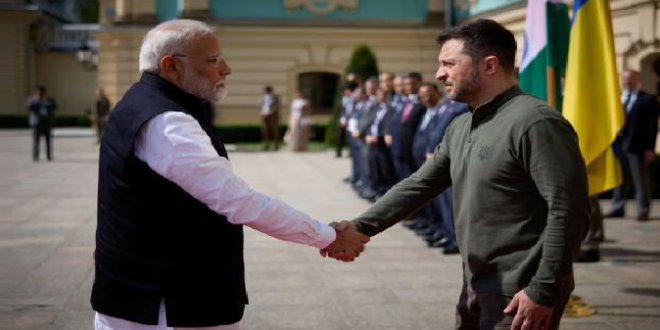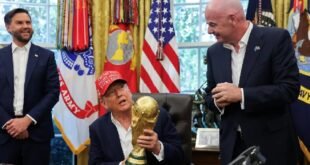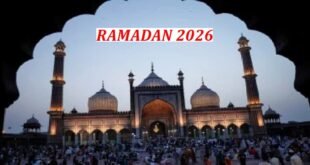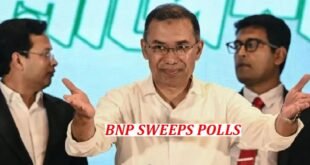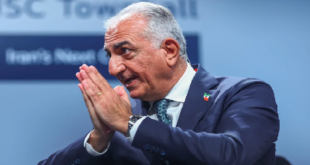25-08-2024
KYIV/ NEW DELHI: Indian Prime Minister Narendra Modi has paid a historic visit to Ukraine, telling President Volodymyr Zelensky he is prepared to play a personal role to bring peace.
The Indian leader was criticized by President Zelensky last month when he hugged Russia’s President Vladimir Putin during a trip to Moscow on a day of deadly Russian strikes, including one on Kyiv’s biggest children’s hospital.
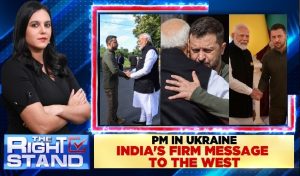 Modi, 73, said he had told Putin that problems could not be solved on the battlefield.
Modi, 73, said he had told Putin that problems could not be solved on the battlefield.
“Both sides will have to sit together and to look for ways to come out of this crisis,” he said after meetings in Kyiv.
Modi arrived in the Ukrainian capital by train from Poland, the first international leader to visit since Ukraine forces crossed into Russia’s Kursk region in early August, seizing more than 1,250 sq km of territory, according to the military.
Six weeks ago, President Zelensky had spoken of his “huge disappointment” at watching Modi warmly hug the Russian leader.
On Friday it was the Ukrainian leader’s turn to be embraced by Modi, although it appeared a more awkward greeting. Zelensky appeared to frown, but equally it may have been the sun in his eyes.
Smiles were few and far between.
Modi is in Ukraine to hold talks with President Volodymyr Zelensky. The trip comes just weeks after he met Russian President Vladimir Putin in Moscow.
The visit is significant because Kyiv and some Western capitals had reacted sharply to Modi’s visit to the Russian capital in July.
Zelensky was particularly critical, saying he was “disappointed to see the leader of the world’s largest democracy hug the world’s most bloody criminal in Moscow”.
So, is Modi visiting Kyiv to placate Zelensky and other Western leaders?
Not entirely.
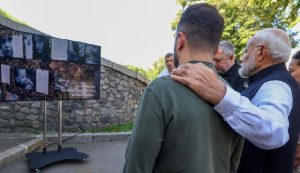 It’s not surprising to see India balance its relations between two competing nations or blocs. The country’s famed non-alignment approach to geopolitics has served it well for decades.
It’s not surprising to see India balance its relations between two competing nations or blocs. The country’s famed non-alignment approach to geopolitics has served it well for decades.
Friday’s visit, the first by an Indian prime minister to Ukraine is more about signaling that while India will continue to have strong relations with Russia, it will still work closely with the West.
Michael Kugelman, director of the South Asia Institute at the Wilson Centre think-tank in Washington, says the trip will further reassert India’s strategic autonomy.
“India isn’t in the business of placating Western powers, or anyone for that matter. It’s a trip meant to advance Indian interests, by reasserting friendship with Kyiv and conveying its concerns about the continuing war,” he says.
However, the timing of the visit does reflect that Indian diplomats have taken onboard the sharp reactions from the US to Modi’s Moscow visit.
India has refrained from directly criticizing Russia over the war, much to the annoyance of Western powers.
Delhi, however, has often spoken about the importance of respecting territorial integrity and sovereignty of nations. It has continuously pushed for diplomacy and dialogue to end the war.
Modi’s Moscow visit in July came hours after Russian bombing killed at least 41 people in Ukraine, including at a children’s hospital in Kyiv, sparking a global outcry.
The Indian PM said the death of children was painful and terrifying but stopped short of blaming Russia. Modi is not likely to deviate from this stance during his visit to Kyiv. The US and other Western nations have grown to accept Delhi’s stand, given India’s time-tested relationship with Moscow and its reliance on Russian military equipment. (Int’l News Desk)
 Pressmediaofindia
Pressmediaofindia
